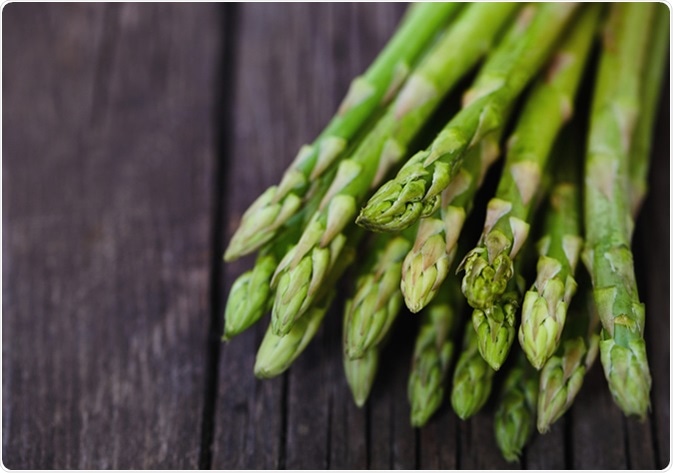Asparagus is a commonly used spring vegetable. It is well known for its specific action on the kidneys, as it can increase urine production and can also be used in irrigation therapy for kidney health. Certain components within asparagus are diuretics and can subsequently act as a kidney and bladder cleanser, as well as assist in the prevention of kidney stones.
The urine of people who have recently eaten asparagus is known to have an unpleasant odor. There are also people who do not report smelling anything unusual in “asparagus urine” and show surprise when asked about it. There are two distinctive traits in this phenomenon, including the excretion of sulfur compounds in urine after eating asparagus and the ability to smell those compounds.

Image Credit: Dasha Petrenko / Shutterstock
Basic facts
From the aforementioned traits, two variations can be noticed. While some people secrete sulfur compounds through their urine following the consumption of asparagus but cannot smell them, others can smell the compounds in their urine without the ability to secrete the same compounds. Thus, it is clear that the caliber to identify the smell of the secreted compound after consuming asparagus is not alone genetic.
Three conclusions can be drawn about the phenomenon of smelly urine after eating asparagus:
- Some people have the ability to smell “asparagus urine” while others do not. This specific anosmia, or inability to smell a certain odor, is associated with a single nucleotide polymorphism (SNP) near the olfactory receptor gene OR2M7, a protein-coding gene.
- Some people are incapable of producing the compounds that are believed to cause the “asparagus pee” smell in detectable quantities. Therefore, the urine of these individuals will not have a distinct odor.
- The ability to produce odorous asparagus metabolites is not tightly related to the ability to smell them.
Asparagus metabolites
Asparagus is high in sulfur and contains both asparagusic acid and its derivatives, which are unique to this vegetable. Although the acid itself does not smell, after eating it, enzymes in the body break the acid down into certain compounds to produce ammonia and sulfur-containing products. These sulfur compounds include thiols and S-methyl thioesters, which are the compounds that provide a characteristic smell to the urine.
Some of the organic compounds that evaporate rapidly in urine, which are otherwise known as volatile compounds, are the cause for the asparagus-breakdown smell. These volatile compounds include:
- Methanethiol—an organosulfur compound with the chemical formula CH3SH. This colorless gas gives a distinctive rotten smell.
- Dimethyl sulfide—an organosulfur compound with the formula (CH₃)₂S and has a characteristic disagreeable odor.
- Dimethyl disulfide—an organic chemical compound with the molecular formula CH₃S2 and is associated with an unpleasant and garlic-like odor.
- Bis (methylthio) methane—an organosulfur compound with a strong odor.
- Dimethyl sulfoxide—an organosulfur compound with the formula (CH₃)₂SO.
- Dimethyl sulfone—an organosulfur compound with the formula (CH₃)₂SO₂
The Mystery Of Asparagus Pee
Genetics and asparagus anosmia
The smell begins in 15-30 minutes after the first bite of asparagus for most people and may last for a few hours. A small percentage of people cannot smell the odor in “asparagus urine.” The inability to smell odors is called anosmia, and those unable to smell asparagus metabolites in their own urine as well as in others’ urine are said to be asparagus anosmic. Asparagus anosmia is associated with variations in the DNA sequence called SNPs that determine our sense of smell.
Humans perceive a wide variety of chemicals as having distinct odors. The nose perceives the odor when the olfactory receptors (ORs) detect the odorants. The chromosomal locations of members of each OR subfamily reveal that most subfamilies are encoded by a single chromosomal locus. The production of odorants varies in each individual; therefore people with undetectable odor in urine may still produce the odorous compounds in their urine but at a lower concentration.
Differences in the ability to metabolize the proteins in asparagus are another factor that can contribute to whether 'asparagus urine' is odorous or not. Besides genetics, how frequently a person eats asparagus also has an effect on their ability to detect the smell of sulfur compounds.
It is currently estimated that 871 variations in the DNA sequence are associated with asparagus anosmia. These SNPs are located on chromosome 1, which is a chromosomal region that contains multiple genes that are connected to the sense of smell. There are a total of 46 chromosomes that are possessed by humans, which are categorized into 23 pairs. Chromosome 1, which contains nearly 249 million DNA base pairs, is the largest of the human chromosomes.
Generally, a majority of women seem to report that they cannot smell the odor. Despite this reporting, women are known to identify smells more accurately and consistently. Therefore, the real reason for this inability to distinguish a foul odor after consuming asparagus could be that women are less likely to notice an unusual odor because of their position during urination.
Cessation
Many studies have been conducted to determine the reason behind “asparagus urine,” most of which lack an adequate amount of details. Recent and ongoing research illuminates the fact that both genetics, as well as metabolism, plays a vital role in the smell of asparagus in the urine.
References
Further Reading
Last Updated: Apr 5, 2023